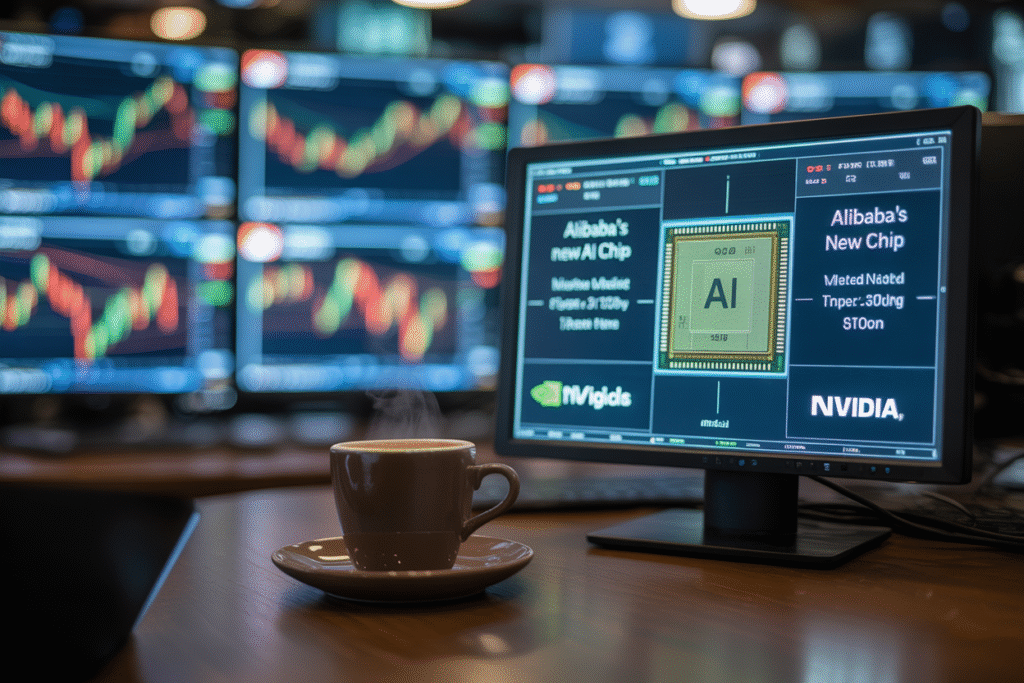Alibaba just dropped an AI chip that costs less and does more—sparking fears of a U.S. tech meltdown.
Wall Street is drunk on AI hype, but a sobering headline slipped through the noise this morning: Alibaba unveiled a general-purpose AI chip that threatens to undercut Nvidia, crater margins, and redraw the global tech map. If you own semiconductor stocks—or simply care about where the next million jobs will be created—this story is your wake-up call.
The Silicon Shockwave
At 11:05 GMT, trader Gareth Soloway posted a chart that lit finance Twitter on fire. The graphic showed Alibaba’s new chip running image recognition, language tasks, and recommendation engines side-by-side with Nvidia’s flagship—at roughly half the price. Within minutes, the post racked up 187 likes and dozens of replies asking the same question: is the U.S. losing the AI hardware race?
The numbers are hard to ignore. Alibaba claims 30% better energy efficiency and a 40% smaller die size, meaning more chips per wafer and lower production costs. For hyperscalers already sweating GPU shortages, that math is irresistible.
But cheaper silicon is only half the story. The real earthquake is geopolitical. U.S. export restrictions were supposed to keep cutting-edge AI out of China’s hands; instead, Chinese engineers built their own shortcut.
Wall Street’s Blind Spot
Ask any analyst covering Nvidia, AMD, or Intel and you’ll hear the same mantra: demand is infinite, margins are safe, and competition is years away. Soloway calls that view a blind spot—one that could cost investors billions.
Consider the ripple effects. If Alibaba’s chip scales, cloud providers like Amazon and Google suddenly have leverage to demand lower prices from U.S. suppliers. Lower prices mean lower revenues, which means lower stock prices. Multiply that across the entire semiconductor supply chain and you get a sector-wide repricing.
And it’s not just investors. Every gigabyte that moves to a cheaper Chinese chip is a gigabyte that no longer supports U.S. fabs, packaging plants, or software engineers. The knock-on job losses could dwarf the gains from any domestic stimulus package.
Jobs on the Chopping Block
Silicon Valley loves to talk about disruption, but it hates to talk about who gets disrupted. Lower-cost AI chips don’t just squeeze margins—they squeeze people.
Picture a mid-level engineer in Austin whose entire role is optimizing CUDA kernels for Nvidia GPUs. If Alibaba’s open-source stack becomes the new standard, that skill set loses market value overnight. Multiply that by thousands of engineers, sales reps, and supply-chain managers.
On the flip side, cheaper chips could democratize AI for startups in Lagos, São Paulo, and Jakarta. The net global effect might be positive, but the local pain will be concentrated in U.S. tech hubs already grappling with layoffs.
The Regulation Tightrope
So what can policymakers do? Banning Alibaba chips outright would invite WTO retaliation and hurt consumers who benefit from lower cloud costs. Subsidizing U.S. fabs helps, but subsidies can’t outrun physics—if the Chinese process node is genuinely more efficient, throwing money at older tech won’t close the gap.
One idea gaining traction is a targeted export tax on AI chips sold to non-allied nations. The goal: level the playing field without triggering a full trade war. Critics argue such a tax would simply push buyers toward Alibaba even faster.
Meanwhile, venture capital is already hedging. Funds that once poured cash into GPU-centric startups are quietly pivoting to software layers that abstract away hardware entirely. The bet: if chips become commoditized, the real value moves up the stack.
Your Next Move
Whether you’re an investor, engineer, or simply an AI user, the takeaway is the same: diversify your assumptions. The era of Nvidia as the undisputed king of AI silicon may be ending—not with a bang, but with a cheaper, quieter chip from Hangzhou.
Check your portfolio for overexposure to semiconductor names. If you’re hiring, look for talent that can hop between hardware stacks. And if you’re building a startup, ask yourself whether your moat is technology or timing—because timing just shifted.
Ready to dig deeper? Drop your email below for a free teardown of which U.S. firms face the biggest Alibaba risk—and which ones might actually benefit from the shake-up.


